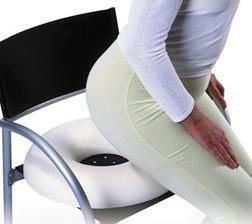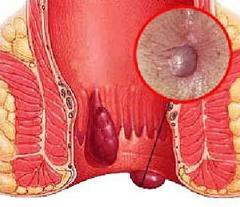 Modifications of venous plexuses located around the rectum, with poor blood circulation, are called hemorrhoids. Overflowing with blood veins expand and form knots.
Modifications of venous plexuses located around the rectum, with poor blood circulation, are called hemorrhoids. Overflowing with blood veins expand and form knots.
Hemorrhoids are often diagnosed during pregnancy, and the likelihood of its occurrence depends on the number of births.
Thus, in primiparous women, the disease occurs only in 20% of cases, and in the case of its re-birth it increases to 40-50%, especially in the third trimester.
Causes
In the period of childbirth and childbirth, hemorrhoidal nodes occur in hundreds of thousands of women, bringing them huge troubles. Some women, feeling false shame before the doctor, hope that the disease will pass itself, that nothing to do is not necessary, but this often only aggravates their condition.
As a result, hemorrhoids are formed, interfering with normal life, disrupting mobility and performance, negatively affecting the psychoemotional state of the young mother.
Usually,provokers of the diseaseThere are such factors:
- Stagnation of venous blood in the pelvis- the consequence of pressing the venous vessels with a growing uterus, which causes the expansion of cavernous bodies and the development of hemorrhoids.
- Chronic constipation. When a woman has chronic constipation, increased tension and increased tension on the walls of the rectum during defecation. And this in itself leads to the formation of hemorrhoids in the intestine. Firstly, a person in the toilet strangles during constipation, overexerting the hemorrhoidal veins, and secondly, during constipation the stool becomes very stiff and begins to simply irritate the swollen veins. The frequency of constipation in pregnant women is much higher, which is mainly due to a decrease in the intestinal tone during pregnancy.
- Sedentary lifestylepregnant in late terms - leads to venous stasis in the veins.
- During pregnancy, tastes can vary. Excessive absorption of salty, spicy and smoked irritates the intestinal epithelium. This provokes the formation of hemorrhoids.
It is necessary to consider these facts and lead a normal image in life, without abusing culinary whims.
Types of hemorrhoids
There are several clinical types of hemorrhoid development, the manifestations of which have certain differences:
- Acute- characterized by a rapid increase in clinical manifestations in the form of pain and itching in the rectal area. It often develops in the second trimester of pregnancy or after childbirth.
- Chronic. This species is most common, as the disease of hemorrhoids is rather a pathology of the veins of the large intestine. Various medications help to remove inflammation, improve stools, but cure and relieve completely of the disease can not. With a certain kind of action, the hemorrhoids will resume.
- Complicated- a more severe course of the pathological process, which is accompanied by the presence of cracks in the rectal mucosa, their infection with bacteria with the development of paraproctitis (purulent inflammation), damage to the walls of hemorrhoids with possible bleeding from them.
In addition, the disease manifests itself in two forms, depending on the location of the nodes:
- Internal, having a complex diagnosis due to unexplained symptoms. With her evil are folds of the intestine and cause discomfort only when defecating. This form is more often chronic and can be accompanied by a thrombosis and other dangerous phenomena.
- External or external, accompanied by the appearance of cones, bloody discharge and exacerbated pain. The lumps themselves with the external form of hemorrhoids are rarely damaged, can not cause painful sensations when emptying the intestine. In patients with this form, there is practically no thrombophlebitis.
To reveal a hemorrhoids to the doctor, as a rule, it is not difficult. Specific complaints allow you to quickly diagnose. A finger examination is mandatory. Sometimes to clarify the diagnosis it is possible to perform a sigmoidoscopy - a study in which a special optical device is inserted into the rectum. It allows you to see what happens in the rectum.
Symptoms
 The signs of hemorrhoids during pregnancy differ little from the symptoms of hemorrhoids as an independent disease.
The signs of hemorrhoids during pregnancy differ little from the symptoms of hemorrhoids as an independent disease.
In total there are three stages of hemorrhoid development. In the first of these, the hemorrhoidal nodes only sag in the lumen of the rectum, but do not leave the aperture of the anus.
Later, during the second stage, the hemorrhoidal nodes are already sagging from the anus, but it is easy enough to reenter back after a while. But in the third stage of the disease the nodes no longer fit into the rectum and remain outside the anus.
In acute its coursea woman may notice the following symptoms:
- Unpleasant sensations or even pain in the anus.
- Painful sensations during the hike "big".
- Feeling of incomplete emptying of bowels during defecation.
- A feeling of high humidity in the area of the anus.
- An increase in hemorrhoids and their outward exposure.
- Mucous and spotting from the anus.
- Itching and irritation of the skin around the anus.
The initial stage of hemorrhoids is usually not noticed by women, and when the problem becomes palpable, the treatment of hemorrhoids becomes more difficult. Therefore, all future mothers, even at an early pregnancy, are recommended to undergo an examination with a proctologist to eliminate the disease or cure it at an early stage.
Prevention
Adhere to certain preventive measures to minimize the occurrence of this unpleasant disease.
- Get rid of constipation. In order not to have problems with the stool, the diet should regularly contain vegetables and fruits, sour-milk products, vegetable oil.
- After each bowel movement, wash the perineum with cool water. You can use a decoction of chamomile or marigold, because they have an anti-inflammatory effect.
- Remove spices, smoked products, pickled and salted foods from the diet. The emphasis should be on vegetables and fruits, which are easier to digest and stimulate the contractile function of the intestine. It is good to eat buckwheat and oatmeal porridge, bread of coarse grinding.
- Move regardless of the gestational age. Ideally, every morning should start with charging. Daily walking is good.
In general, the prevention of hemorrhoids should be dealt with every pregnant woman, then, most likely, and before the treatment does not reach.
How to treat hemorrhoids in pregnancy
Hemorrhoids develop slowly. But than "further he has come", the it is more difficult from it to get rid at pregnancy.
If in the initial stages it can be treated only by adjusting the diet and adherence to a special hygienic regimen, then, as for later stages of the disease, then a combined medical treatment of hemorrhoids is required, and in severe cases, a surgical operation may be required.
- The first thing to pay special attention to is the diet of a pregnant woman. Nutrition should be such that to exclude the possible development of constipation, since the main guarantee for the successful treatment of hemorrhoids - timely evacuation of the intestine. This factor must be taken into account when making a menu.
- Another important point that needs to be paid attention is the rules of personal hygiene. Doctors advise future mothers to stop using conventional toilet paper and purchase special wet wipes in the pharmacy.
In the official medicine for the treatment of hemorrhoids used combined ointments, creams, rectal suppositories, they act immediately in several directions and have:
- anesthetizing;
- anti-inflammatory;
- vasoconstrictive;
- laxative action.
Drugs are selected in each individual case, taking into account the complexity of the course of the disease and the site of inflammation of the hemorrhoids. And medicines can and should be prescribed only by a doctor! During pregnancy this is doubly important.
Cm. also: than to treat hemorrhoids after childbirth at home.
Candles from hemorrhoids during pregnancy
It is important to understand that any preparations, including candles from hemorrhoids during pregnancy should be used with caution. The fact is that these drugs often have a number of contraindications and side effects.
Candles have two directions of action:
- Painkillers. They also remove inflammatory processes in the rectal area. This group includes a large number of medicines, but in pregnancy you can use only some of them. The medicine should not contain analgesics, which are harmful to the child.
- Haemostatic. Such drugs are very relevant for women during pregnancy. Do not allow excessive loss of blood, it can be bad for the child. To treat cracks in the anal passage, candles with sea buckthorn oil will work well.
Before using any candles or ointments, you need the approval of the doctor who is leading your pregnancy.
Removal of hemorrhoids
Non-surgical removal of hemorrhoids does not pose a high risk for a pregnant woman, all procedures are performed under local anesthesia. In some cases, removal of hemorrhoids is the only way to get rid of the problem, preventing its development in more severe stages.
Today, doctors have the opportunity to conduct so-called small or bloodless operations:
- SclerotherapyIt is performed in case of high risk of bleeding at any stage of the disease. With the help of this procedure, the blood supply to the hemorrhoidal node is suspended, as a result of which it dies off.
- LigationHemorrhoidal nodes are performed only at stages 1 and 2 of the disease. The essence of the procedure is the tug of the base of the node with the help of a latex ring. Within about a week after the procedure, the node dies off, it disconnects from the rectum wall.
- Infrared photocoagulationand laser coagulation (laser exposure or high temperature on the base of the hemorrhoidal node in 3 to 5 points, at which a burn occurs, causing necrosis of the node with its subsequent falling off within 7-10 days).
If a woman's condition allows to avoid surgical intervention during pregnancy, the doctor may decide to postpone the operation.

How to choose probiotics for the intestine: a list of drugs.

Effective and inexpensive cough syrups for children and adults.

Modern non-steroidal anti-inflammatory drugs.

Review of tablets from the increased pressure of the new generation.
 Antiviral drugs are inexpensive and effective.
Antiviral drugs are inexpensive and effective.



